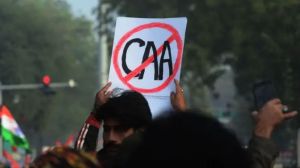The idol prime minister
On an ancient hilltop in Gwalior a new temple has come up. The garbha griha is still empty and the idol, made of the appropriate ashtdhatu, ...

On an ancient hilltop in Gwalior a new temple has come up. The garbha griha is still empty and the idol, made of the appropriate ashtdhatu, adorns a lawyer’s chamber in the city. It has already travelled to Ujjain during the Kumbh for a dip in the Kshipra. Before it is consecrated it has to travel to Mathura, Kashi and, rather disconcertingly, to Ayodhya, where it will also be taken to the disputed shrine. By the time Atal Behari Vajpayee finds a place among the Hindu pantheon in his hometown on July 2, his position as Prime Minister would have been settled.
But the consecration will not take place without a fight. The administration has served notice to advocate Vijay Singh Chauhan that his organisation, the Akhil Bhartiya Yuva Abhibhashak Manch, is setting up the temple on encroached land. Chauhan’s defence is that the area is not revenue land but rather temple land, that is part of an old religious site established by the Scindias centuries back. Just days before polling in Gwalior, the home of both Vajpayee and the Scindias, this religious excursion into Scindia land seems to be but a continuation of an old battle on secular turf. Vajpayee first fought an election from the constituency in 1971, winning by 70,310 votes. This was the Rajmata’s territory and until her son Madhavrao contested in 1984, the Congress was more often than not on the losing side. The 1984 results—Maadhavrao defeated Vajpayee by the huge margin of 1,75,594 votes—showed that here it was not the party but the Scindia name that counted. Madhavrao was to win five more elections from Gwalior, till the threat from a political upstart saw him move to the Shivpuri constituency.
Sitting BJP MP Jaybhan Singh Pawaiya was the product of a very different and far more fiery brand of politics than the old Jan Sangh culture that had moulded Atal Behari.
He had headed the Bajrang Dal in the state and was one of the persons responsible for raising the Bhojshala/Kamal Maula Masjid controversy. Shortly before the 1998 election, he led a band of Bajrang Dal volunteers who planted a saffron flag on the roof of the structure.
The act was to lead to an ASI clampdown on access to the shrine. Five years later, the Sangh Parivar, in typical fashion, tried to reap the harvest of their own act by holding the Digvijay government responsible for the restrictions.
Pawaiya’s hard-hitting campaign in 1998 targeted the tyranny of the ‘Mahal’, which is but shorthand for the Scindias in the entire Gwalior-Chambal region. Madhavrao scraped through with a lead of barely 26,729 votes.
Discretion being the better part of valour, Scindia headed to safer pastures, leaving Pawaiya an easy winner in 1999.
But things are very different today. Pawaiya is the incumbent, and a faltering one at that. To his credit, he is not perceived to be corrupt but the charges of arrogance, of a failure to carry out developmental work are far more damaging amidst today’s electorate.
With chameleon-like abilities, he senses the changed mood. His pitch now is simple, a vote for him is a vote for Vajpayee, a vote that will allow the NDA to carry on developmental activities under the leadership of an able prime minister. Gone is the old bluster or any rhetoric typical of the Bajrang Dal, the Mahal is still a target but it doesn’t quite find the same echo among the voters.
Pitched against him is Ram Sevak Singh. He is considered accessible, willing to listen to the people. And in addition he has Jyotiraditya Scindia’s backing. There had been a demand before Ram Sevak was selected that Jyotiraditya’s mother should contest this seat. Now Ram Sevak reminds the voters of the work Madhavrao had done for this constituency, the new trains, the several buildings and roads constructed in the region.
By proxy, Vajpayee is locked in a battle against the Scindia legacy once again. But it is no longer the uneven contest it was in 1984. Ordinarily Pawaiya would have stood no chance but the Vajpayee factor now counts for a lot. In areas such as Bundelkhand, where he is much like an avuncular figure, in village after village they say that they are voting for ‘‘babba’’. Here he is simply Atalji. And if he can pull of this proxy fight in Gwalior, come July 2, Vajpayee may well manage the impossible task of being a prophet among his own people.



- 01
- 02
- 03
- 04
- 05




























